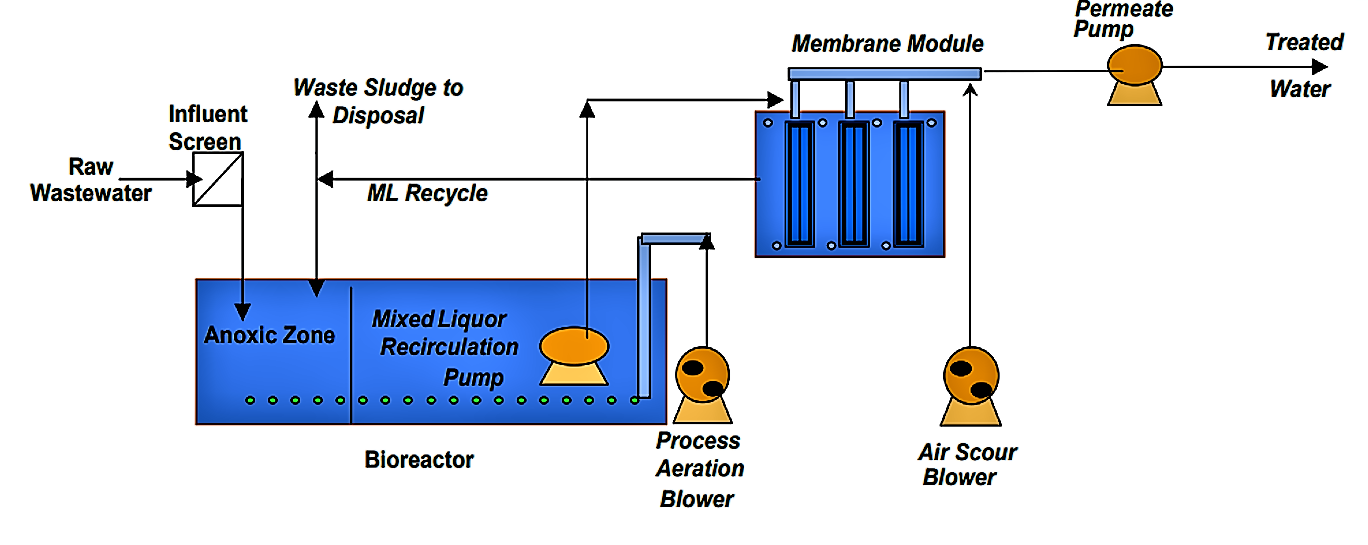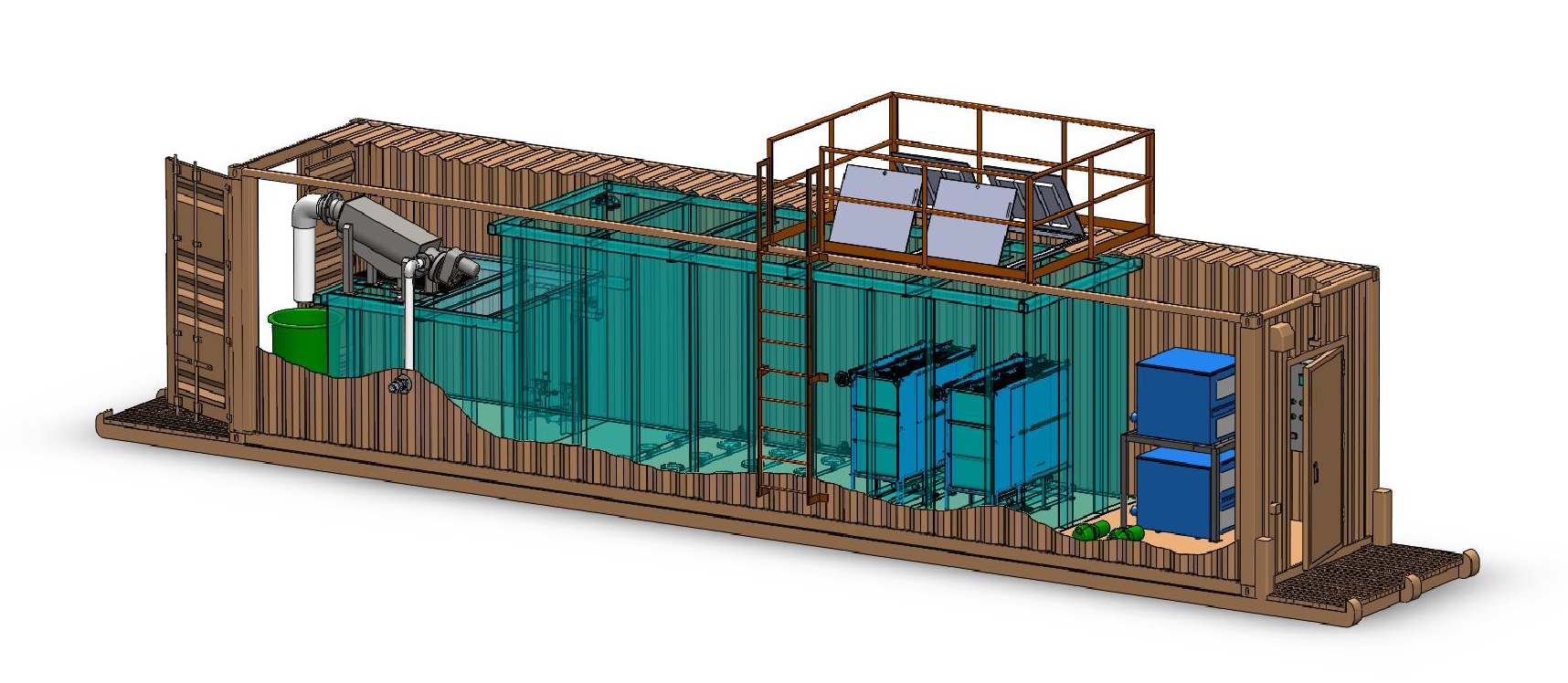How to Optimize Membrane Bioreactor Performance for Maximum Efficiency
How to Optimize Membrane Bioreactor Performance for Maximum Efficiency
Blog Article
The Advantages of Membrane Layer Bioreactors in Lasting Wastewater Administration
Membrane layer bioreactors (MBRs) represent a pivotal advancement in lasting wastewater management, successfully combining biological treatment with sophisticated membrane layer filtering innovation. As the need for lasting remedies magnifies, discovering the diverse benefits of MBRs might reveal unforeseen ramifications for the future of wastewater therapy systems.
Overview of Membrane Bioreactors
Membrane bioreactors (MBRs) represent a considerable advancement in wastewater treatment innovation, integrating biological degradation with membrane layer filtration to enhance the effectiveness of the treatment procedure. This ingenious system combines the benefits of conventional activated sludge processes with membrane layer innovation, enabling enhanced solid-liquid splitting up. MBRs make use of semi-permeable membrane layers to separate cured water from biomass, resulting in high-grade effluent that can be recycled or safely discharged right into the environment.
The functional style of MBRs normally entails a bioreactor where microorganisms damage down organic issue, followed by a membrane system that filterings system the blended alcohol. This arrangement not just reduces the impact of the therapy center however also allows for higher biomass concentrations and minimized hydraulic retention times. MBRs are qualified of treating a wider variety of pollutants, including virus and nutrients, making them suitable for numerous applications, from municipal wastewater therapy to commercial effluent processing.
The combination of MBRs right into wastewater administration systems is indicative of a growing trend in the direction of lasting and efficient techniques in environmental design. Their capacity to create high-grade effluent while minimizing space needs settings MBR modern technology as a key gamer in modern-day wastewater treatment options.
Boosted Effluent High Quality

The membrane purification procedure works as a physical obstacle, allowing the retention of microorganisms and particle matter, which adds to a more clear and cleaner effluent (Membrane Bioreactor). Moreover, MBRs operate at greater biomass concentrations than conventional turned on sludge systems, advertising more reliable biodegradation of contaminants. This brings about a reduction in biochemical oxygen need (BODY) and complete suspended solids (TSS) levels in the last effluent
Additionally, MBRs demonstrate superb performance in dealing with difficult wastewater make-ups, such as industrial effluents and wastewater with high nutrient lots. Therefore, the effluent generated is usually of better, permitting more adaptable disposal choices and lowered environmental influence. Ultimately, the improved effluent top quality accomplished via MBR technology highlights its critical function in progressing sustainable wastewater monitoring techniques.
Water Reuse Opportunities
The premium effluent generated by membrane bioreactors (MBRs) opens up considerable possibilities for water reuse in various applications. MBRs efficiently get rid of pollutants, including microorganisms, put on you can find out more hold solids, and natural issue, leading to cured water that fulfills or exceeds regulatory standards for reuse. This high quality allows for the implementation of water recycling initiatives across diverse fields.
One popular application remains in agriculture, where dealt with wastewater can be utilized for irrigation, promoting sustainable farming practices while conserving fresh water sources. Additionally, MBR-treated effluent can be used for commercial procedures such as air conditioning, cleansing, and as a procedure water resource, dramatically lowering the need for drinkable water in these procedures.
In metropolitan atmospheres, MBRs help with making use of redeemed water for landscape irrigation, commode flushing, and various other non-potable usages, adding to the general strength of supply of water systems. Additionally, the integration of MBR technology in decentralized systems help in managing localized water demands, particularly in water-scarce areas.
Reduced Environmental Impact
Just how can the fostering of membrane bioreactors (MBRs) add to a reduced environmental influence in wastewater administration? MBRs considerably enhance the treatment efficiency of wastewater while decreasing environmental disturbances. By incorporating find this biological treatment processes with membrane layer filtering, MBRs effectively get rid of a vast array of contaminants, including natural matter, nutrients, and virus. This innovative filtration leads to higher-quality effluent, which is critical for securing aquatic communities and decreasing the worry on natural water bodies.
Furthermore, MBRs run at lower hydraulic retention times compared to standard systems, resulting in smaller sized treatment plant impacts. This compact design decreases land use, consequently preserving natural environments and biodiversity. The procedure also creates much less sludge than typical methods, alleviating disposal obstacles and decreasing greenhouse gas discharges connected with sludge management.
Furthermore, MBRs promote the recovery of beneficial resources, such as water and nutrients, contributing to a round economy. By enabling water reuse for watering or industrial procedures, MBRs help reduce freshwater scarcity, hence promoting lasting water use practices. Ultimately, the adoption of MBR modern technology represents a considerable stride towards reducing the environmental effect of wastewater management systems.
Economic Benefits of MBRs

In addition, MBRs help with the production of high-quality effluent, which can be recycled for various applications, such as agricultural irrigation and industrial procedures - Membrane Bioreactor. This reuse capacity can significantly lower water procurement costs, supplying an economic reward for sectors facing strict water policies
The portable layout of MBR systems additionally leads to lowered land demands, which is especially valuable in urban locations where genuine estate is costly. By minimizing room, sectors and towns can minimize land procurement and upkeep costs.
Furthermore, MBRs commonly call for much less regular maintenance and have a longer lifespan than traditional systems, further adding to set you back financial savings. In summary, the financial advantages of MBRs-- varying from minimized operational costs to land savings and effluent reuse-- make them an engaging option for sustainable wastewater monitoring, providing both long-term and immediate economic advantages.
Conclusion
In addition, MBRs contribute to reduced environmental effects via small styles and lower sludge generation. Economic advantages Discover More Here better improve their practicality, making MBRs an appealing remedy for resolving the difficulties of wastewater treatment and advertising lasting source monitoring.
Membrane layer bioreactors (MBRs) stand for a pivotal advancement in lasting wastewater monitoring, effectively merging organic treatment with innovative membrane filtering modern technology.Membrane layer bioreactors (MBRs) stand for a significant advancement in wastewater therapy modern technology, integrating organic deterioration with membrane layer purification to enhance the performance of the therapy process.Attaining enhanced effluent top quality is one of the most considerable advantages of utilizing membrane layer bioreactors (MBRs) in wastewater treatment.In addition, MBRs demonstrate excellent performance in dealing with challenging wastewater make-ups, such as commercial effluents and wastewater with high nutrient loads.Integrating membrane bioreactors (MBRs) right into wastewater monitoring not only reduces environmental influence yet additionally provides substantial economic benefits.
Report this page